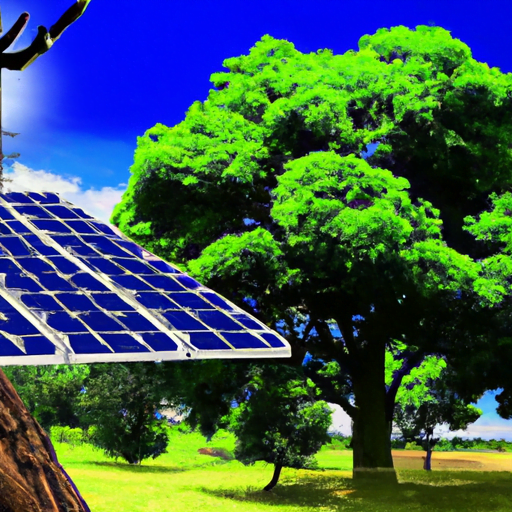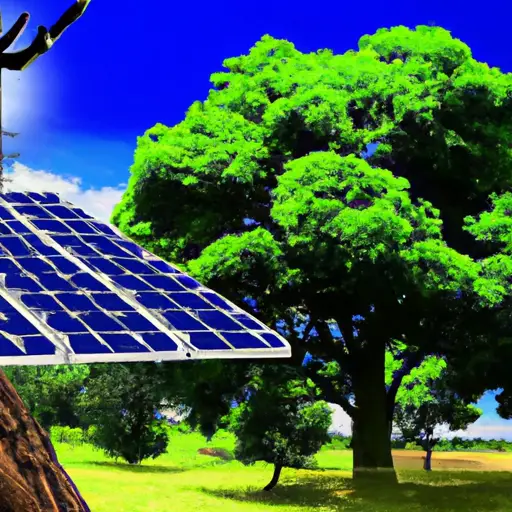Have you ever wondered what it would be like to disconnect from the grid and live off the land, just like our ancestors did? It’s an intriguing concept – being completely self-sufficient, growing your own food, and living off renewable energy sources. But, in this increasingly digital age, one question often comes to mind: can you stay connected to the Internet while living off-grid?
The answer is yes, you can stay connected to the Internet even when living off-grid, but it does come with some challenges. In order to access the Internet, you’ll need a reliable and fast internet connection, which can be quite a task when you’re living in a remote location. However, there are options available such as satellite internet, which can provide connectivity even in the most secluded areas.
Another option for staying connected to the Internet off-grid is through the use of mobile hotspots or wireless routers. By setting up a mobile hotspot or using a wireless router, you can access the Internet through cellular data or mobile broadband, allowing you to stay connected wherever you are. However, it’s important to note that the availability and speed of these connections may vary depending on your location.

What is Off-Grid Living?
Defining Off-Grid Living
Off-grid living refers to a lifestyle where individuals or communities choose to disconnect from the traditional utility infrastructure, such as electricity, water, and sewage systems, and instead rely on self-sustainable alternatives. It is a way of life that embraces self-sufficiency and minimizes the reliance on external resources. Off-grid living can include various aspects such as generating your own energy, growing your own food, and managing water and waste independently.
Embracing Self-Sufficiency
One of the primary goals of off-grid living is to become self-sufficient in meeting your basic needs. By producing your own food, harvesting rainwater, and generating your own electricity, you reduce your dependence on external sources, making you less vulnerable to infrastructure failures, supply disruptions, or rising utility costs.
Benefits of Off-Grid Living
There are numerous advantages to embracing off-grid living. First and foremost, it allows a greater sense of independence and freedom. By relying on your own systems, you are not bound by the restrictions or limitations imposed by utility providers. Additionally, off-grid living promotes sustainability, as it often involves using renewable energy sources and reducing carbon footprints. This lifestyle choice can also lead to significant cost savings in the long run, as you are no longer reliant on monthly utility bills.
Challenges of Off-Grid Living
Limited Access to Modern Amenities
One of the challenges faced by those living off the grid is the limited access to modern amenities that most people take for granted. Being disconnected from the main power grid means no constant supply of electricity, which can greatly impact day-to-day activities. Similarly, not having access to municipal water and sewage systems requires alternative solutions for managing these basic human needs.
Energy Generation and Management
Generating and managing electricity off-grid can be a significant challenge. While solar power is a popular choice, it can be affected by factors such as weather conditions and limited sunlight in certain geographical locations. Depending on the energy demand, a combination of renewable sources like wind or hydro power may be necessary. Additionally, storing excess energy for times when the renewable sources are not sufficient requires careful planning and investment in efficient battery systems.
Water and Waste Management
Without access to municipal water and sewage systems, off-grid living requires creative solutions for water and waste management. Collecting and treating rainwater for consumption, using composting toilets or septic systems, and recycling wastewater are some of the options that off-grid dwellers need to consider. Balancing water usage with conservation efforts becomes crucial in these scenarios.
The Importance of Internet in Today’s World
Role of Internet in Daily Life
In today’s connected world, the internet plays a crucial role in nearly every aspect of our lives. From staying updated with the latest news to connecting with friends and family, the internet has become an essential tool for communication and information sharing. It has transformed how we work, learn, shop, and entertain ourselves.
Work and Business Connectivity
For many people, the internet is vital for their work and business needs. Remote work has become more prevalent, allowing individuals to work from anywhere. The internet enables seamless collaboration, communication, and access to necessary resources, regardless of physical location. It has also facilitated the rise of online businesses and e-commerce, opening up opportunities for entrepreneurs to reach a global market.
Education and Learning Opportunities
The internet has revolutionized education by providing access to vast amounts of knowledge and learning resources. Online courses, tutorials, and educational platforms have made learning more accessible, affordable, and flexible. Students from remote areas or those pursuing lifelong learning can benefit greatly from the internet’s educational opportunities.

Exploring Internet Options for Off-Grid Living
Satellite Internet Services
Satellite internet is a popular choice for off-grid dwellers due to its availability in remote areas. It utilizes geostationary satellites to provide internet connectivity. However, it does have limitations in terms of high latency and limited data caps. Additionally, initial setup costs and monthly service fees can be higher compared to traditional broadband options.
Cellular Data and Hotspot Solutions
Cellular data and mobile hotspot solutions provide internet connectivity through wireless networks. They can be a viable option for those living off the grid, especially if they are within range of a cellular tower. However, signal strength and coverage can vary depending on the location, terrain, and distance from the tower. Data usage restrictions and potential high costs for extensive data consumption should also be considered.
Wireless Internet Solutions
Wireless internet solutions, such as point-to-point or point-to-multipoint wireless, can be an effective option for off-grid connectivity. These systems use radio signals to establish a connection between a central hub and the user’s premises. They can provide high-speed internet access, but require line-of-sight or near-line-of-sight clearance between the transmission points.
Factors Affecting Internet Connectivity off the Grid
Geographical Location
The geographical location of an off-grid dwelling plays a crucial role in determining the availability and quality of internet connectivity options. Remote areas may have limited infrastructure and coverage, making it more challenging to establish a reliable connection. In such cases, alternative solutions like satellite internet or wireless technologies may be the only viable options.
Terrain and Natural Obstacles
The terrain surrounding an off-grid location can have a significant impact on internet connectivity. Dense forests, mountains, or terrain with numerous obstacles can obstruct radio signals and reduce the effectiveness of wireless internet solutions. It is essential to assess the local topography and consider the potential signal interference caused by natural features.
Distance from Communication Infrastructure
The distance from the nearest communication infrastructure, such as cellular towers or internet service providers, can affect internet connectivity off the grid. Longer distances can result in weaker signals, lower data rates, and higher latency. It is crucial to evaluate the proximity of these infrastructures when considering internet options for off-grid living.
Advancements in Off-Grid Internet Technologies
Solar-Powered Internet Systems
Advancements in solar power technology have made it possible to generate electricity off-grid and power internet systems. Solar-powered internet systems utilize solar panels to capture sunlight and convert it into electricity. These systems can be combined with satellite, cellular, or wireless internet technologies to provide sustainable and reliable connectivity.
Wireless Mesh Networks
Wireless mesh networks are innovative solutions for off-grid internet connectivity. In a mesh network, multiple wireless access points are interconnected to create a self-healing network. This ensures better coverage and reliability, even in challenging off-grid locations. Mesh networks can be powered by renewable energy sources or a combination of renewable and traditional sources.
Low-Earth Orbit Satellites
Low-Earth Orbit (LEO) satellites are a relatively new option for off-grid internet connectivity. Companies like SpaceX, Amazon, and OneWeb are launching constellations of LEO satellites that orbit closer to the Earth, reducing latency and improving coverage. These satellite internet systems can provide high-speed internet access to even the most remote off-grid locations.
Overcoming Internet Connectivity Challenges
Boosting Signal Strength
In off-grid locations with weak internet signals, boosting signal strength becomes crucial. Using external antennas or signal amplifiers can enhance the received signal, improving internet connectivity. Optimizing the antenna placement based on signal strength and direction can help maximize the effectiveness of these enhancements.
Antenna and Router Placement
Proper antenna and router placement can significantly impact internet connectivity. Placing antennas in elevated positions, away from obstructions such as trees or buildings, can improve signal reception and reduce interference. Routers should be strategically placed to ensure optimal coverage throughout the off-grid premises.
Network Optimization Techniques
Employing network optimization techniques can maximize the efficiency of internet connectivity off the grid. Techniques such as bandwidth management, traffic shaping, and Quality of Service (QoS) settings can prioritize internet traffic, ensuring a seamless online experience even with limited resources.
Costs and Considerations for Off-Grid Internet
Installation and Equipment Expenses
Setting up internet connectivity off the grid can require significant upfront costs. The installation of antennas, routers, and other equipment, along with the necessary cabling and infrastructure, can add to the expenses. Additionally, specialized equipment or technology tailored for off-grid environments may come at a premium.
Monthly Service Costs
Monthly service costs for off-grid internet can be higher compared to traditional broadband options. Satellite internet, in particular, often entails higher monthly fees due to the specialized infrastructure and equipment involved. Cellular data plans or wireless internet solutions may also have limitations on data usage, requiring more expensive plans for heavy internet users.
Maintenance and Troubleshooting
Maintaining and troubleshooting off-grid internet systems can be challenging, especially without readily available technical support. Off-grid dwellers should be prepared to handle basic maintenance tasks themselves and have backup plans in place in case of system failures. It is crucial to factor in these considerations when budgeting for off-grid internet connectivity.
Community Initiatives for Off-Grid Internet Solutions
Collaborative Projects and Initiatives
Communities of off-grid dwellers often come together to find innovative internet solutions. Collaborative projects and initiatives involve sharing knowledge, resources, and expertise to develop and implement off-grid internet infrastructure. These community-driven efforts can be instrumental in finding cost-effective and sustainable solutions for off-grid internet connectivity.
Sharing Internet Resources
Sharing internet resources within off-grid communities can help maximize connectivity and provide more cost-effective solutions. By establishing a shared network, individuals can distribute the costs and benefit from a more robust and reliable internet connection. Collaborative efforts can also explore options for community-owned infrastructure or partnerships with local service providers.
Evaluating Community Needs and Solutions
Understanding the unique needs and challenges of the off-grid community is essential when developing internet solutions. Communities must assess their specific requirements, such as the number of users, expected data usage, and desired online activities, to determine the most suitable options. Conducting surveys, sharing experiences, and involving residents in decision-making processes can lead to more effective solutions.
Conclusion
Balancing Connectivity and Off-Grid Lifestyle
Living off the grid offers a unique opportunity to disconnect from the traditional infrastructure and embrace self-sufficiency. However, staying connected to the internet can be a challenge. By exploring various internet options and considering the factors that affect connectivity, off-grid dwellers can strike a balance between their desire for connectivity and their chosen lifestyle.
Exploring Personal Priorities and Trade-Offs
Off-grid living requires individuals to prioritize their needs and make trade-offs. While the internet provides countless benefits, it may come at the cost of increased expenses, technical challenges, or compromising the simplicity of the off-grid lifestyle. Each person or community must evaluate their personal priorities and find a solution that aligns with their values and objectives.
Future of Off-Grid Internet
As technology continues to advance, off-grid internet solutions are expected to become more accessible, affordable, and efficient. Advancements in renewable energy, wireless communication, and satellite technologies are paving the way for better connectivity options off the grid. With continued collaboration and innovation, the future of off-grid internet looks promising, enabling more people to embrace sustainable, self-sufficient living without sacrificing connectivity.




